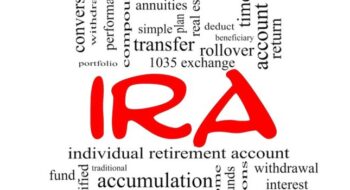Curious about how to minimize capital gains tax on real estate? We’ve got you covered. This article walks you through practical strategies to reduce your tax burden when selling property.
Be sure to get your retirement score today to find out how likely you are to achieve your goals in retirement!
Key Takeaways
- Understanding capital gains tax and utilizing deductions can significantly lower your taxable gains from real estate sales.
- Strategies such as the primary residence exclusion and 1031 exchanges allow for tax deferral, essential for effective estate planning.
- Charitable donations and timing sales strategically can reduce taxable estates and minimize long-term tax liabilities.
For additional financial resources, be sure to visit the IFW site and attend the IFW Retirement Score Live Webinar to receive tailored insights.
Understand Capital Gains Tax on Real Estate

Let’s chat about capital gains tax and why it’s so important for your estate planning, especially if you’re dealing with real estate!
This tax impacts the profits you make when selling assets, and how long you hold onto those assets really matters. Knowing how to minimize capital gains tax on real estate can make a huge difference in your estate strategy and help you navigate taxable estate considerations.
Here’s the deal:
- Short-term capital gains (assets you hold for a year or less): This is taxed as ordinary income, which means rates can hit between 10% and 37% (1).
- Long-term capital gains (assets you hold for longer than a year): This is taxed at a much lower rate, anywhere from 0% to 20% based on your income level (2).
In the bigger picture of estate planning, you’ve got options!
Strategies like a qualified personal residence trust, irrevocable life insurance trust, or even a family limited partnership can help you minimize estate taxes and protect your wealth for your heirs. These methods are great for transferring ownership while reducing the impact of the federal estate tax exemption.
Pro Tip: Don’t forget about deducting selling costs like legal fees and real estate commissions from your total sales price if you want to save even more.
1. Primary Residence Exclusion
The primary residence exclusion is a great way to lower your capital gains tax when selling your home.
Individuals can exclude up to $250,000 of capital gains, while married couples filing jointly can exclude up to $500,000(3). This can significantly reduce your taxable income and estate tax liability.
To qualify, you need to have lived in the home as your main residence for at least two years within the last five years before selling. The two years don’t have to be consecutive, so you can still benefit from the exclusion even if you’ve moved in and out.
There are also special situations that can allow for partial exclusions, such as selling your home for health issues or a job move.
2. Utilize 1031 Exchange

A 1031 exchange is another effective way to work around capital gains tax liability.
It lets investors swap one property for another, deferring the tax on the sale.
This means you can reinvest your profits into new properties without facing immediate tax consequences, which is key for long-term estate planning.
To qualify for a 1031 exchange, the properties must be similar in nature, meaning they’re of like kind. Do note, you also need to identify potential replacement properties within 45 days of selling the original property and complete the entire transaction within 180 days.
A qualified intermediary must manage the exchange, holding the sale proceeds until you buy the new property.
To avoid tax liabilities, the new property’s value must be equal to or greater than the property you sold. When done correctly, a 1031 exchange can defer capital gains taxes, helping to reduce estate taxes and preserve your wealth (4).
3. Consider Installment Sales
Installment sales are a clever strategy for handling capital gains tax over time. By spreading your income across several years, you can potentially lower your overall tax burden each year. This is especially helpful in estate planning, as large one-time gains can push you into higher tax brackets.
In an installment sale, you recognize taxable gains as you receive payments. This means you can reduce your immediate tax liabilities.
Keep in mind that some transactions, like real estate sales by dealers, do not qualify for installment sales.
You do have options! Sellers can choose to opt out of installment treatment and recognize all gains in the year of the sale if that suits their financial situation better. Just remember, this may lead to higher immediate tax payments.
4. Take Advantage of Opportunity Zones

Opportunity Zones are special areas designed to encourage economic development while offering tax benefits to investors. They provide a unique way to defer and potentially reduce capital gains taxes.
By reinvesting capital gains into Qualified Opportunity Funds, you can delay paying taxes on those gains until you sell the investment or until December 31, 2026.
Tax Benefits Over Time:
- Hold for 5 years: Get a 10% reduction on the deferred gain.
- Hold for 7 years: Increase your reduction to 15%.
- Hold for 10 years or more: You can exclude any new gains from taxes altogether, as the investment’s basis adjusts to its fair market value at the time of sale.
Opportunity Zones can be used for various projects, including real estate, infrastructure, and business investments, as long as they involve significant property improvements. This makes them appealing for investors who want to optimize tax savings while positively impacting their communities.
5. Offset Gains with Losses
Tax-loss harvesting is a smart way to reduce your taxable income by using capital losses to offset capital gains. This means selling underperforming assets to realize losses that can help lower your tax bill.
Real estate investors can especially benefit from this strategy by timing their sales with years when they have other capital losses. This approach can effectively reduce the taxable gains from selling properties.
If your capital losses exceed your capital gains, you can deduct up to $3,000 of the excess against your ordinary income each year.
Just be mindful of market conditions and the timing of your sales to make the most of this strategy.
6. Use Home Improvements to Increase Basis

Home improvements are not just about making your living space nicer—they can also be a smart move for your tax planning. When you make capital improvements that significantly boost your property’s value, you can adjust its cost basis for tax purposes. This means you’ll pay less in capital gains taxes when you sell your home.
Examples of capital improvements include:
- kitchen remodels
- new roofs
- upgrading your HVAC system
- swimming pool addition
These enhancements increase your property’s cost basis, which lowers the taxable gains when you eventually sell.
It’s important to know the difference between capital improvements and regular repairs. Regular repairs and maintenance don’t qualify for deductions, but capital improvements do help adjust your cost basis.
But make sure to keep detailed records of all your home improvement expenses!
If you make improvements within 90 days before selling, you can even classify those costs as selling expenses, further boosting your basis and lowering your taxable gains.
7. Leverage Retirement Accounts
Investing in real estate through retirement accounts like self-directed IRAs can be a smart move, especially because it offers some great tax perks.
You get to defer those pesky capital gains taxes until you withdraw money, which can be a real win for your long-term estate planning.
Just remember, be sure to stick to the IRS rules—your IRA should only be used for investment purposes.
When it comes to buying real estate with an IRA, you usually have to pay in cash since getting a mortgage can be a bit tricky. But here’s the upside: any rental income you earn grows tax-free until you take it out, which can really help your portfolio grow over time.
Plus, investing in real estate within an IRA can add some nice diversity to your investment mix and may appreciate in value as time goes on. Using retirement accounts for real estate not only helps reduce estate taxes but also protects your wealth for the future.
8. Charitable Donations of Property

Donating appreciated real estate to charity is not only generous but also offers significant tax benefits.
By donating, you can avoid capital gains tax and claim a deduction based on the property’s fair market value, leading to substantial savings and a reduced taxable estate.
You can deduct the full fair market value of the donated property, lowering your taxable income and providing immediate tax relief. This approach also helps with strategic gifting, allowing you to transfer wealth while considering gift tax implications.
9. Plan Your Sale Timing

Timing the sale of your real estate can significantly impact your tax liability.
By planning to sell during years when your income is lower, you can reduce your capital gains tax and enhance your financial benefits.
If you sell your home in a lower-income year, your capital gains tax could be much lower. Plus, any capital losses can offset capital gains, and if your losses exceed your gains, you can deduct up to $3,000 from ordinary income each year for additional tax relief.
You can also carry forward unused capital losses indefinitely to offset gains in future years. This flexibility is great for long-term tax planning and managing your estate.
Summary
The strategies discussed in this article offer various ways to minimize estate taxes and protect your wealth for future generations.
From understanding capital gains tax and utilizing primary residence exclusions to leveraging retirement accounts and making charitable donations, each approach plays a vital role in effective estate planning.
Careful planning is key, and it’s important to align these strategies with your financial goals.
Don’t wait—start planning today to secure your financial legacy and enjoy peace of mind knowing that your estate is well-protected.
Frequently Asked Questions
What is a 1031 exchange?
A 1031 exchange enables investors to defer capital gains taxes by swapping one investment property for another, provided that the exchanged properties meet specific criteria. This strategy can significantly enhance your investment portfolio and tax efficiency.
How does the primary residence exclusion work?
The primary residence exclusion enables individuals to exclude up to $250,000 in capital gains from the sale of their primary home, or $500,000 for married couples, provided they have lived in the home for at least two years within the last five years prior to the sale. This exclusion can significantly reduce your tax liability when selling your home.
What are Opportunity Zones?
Opportunity Zones are designated areas aimed at encouraging economic development through investments, offering tax benefits to investors who reinvest capital gains into Qualified Opportunity Funds. This not only allows for deferred taxes but also potential significant reductions or exclusions on new gains based on the duration of the investment.
How can installment sales reduce tax burdens?
Installment sales effectively reduce tax burdens by allowing sellers to recognize taxable income incrementally over several years, rather than all at once. This strategic approach can minimize overall capital gains tax obligations, leading to lower tax liabilities annually.
What are the benefits of donating property to charity?
Donating property to charity offers significant tax advantages, such as avoiding capital gains tax and receiving a deduction based on the fair market value. This not only results in substantial tax savings but also helps reduce your taxable estate.
See How You Can Boost Your IFW Retirement Score

When you request your IFW Retirement Score, an IFW Certified Financial Professional will help you discover ways to:

Lower or potentially eliminate taxes in retirement

Protect your retirement portfolio

Secure a stable income stream throughout retirement




